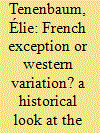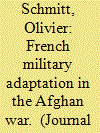|
|
|
Sort Order |
|
|
|
Items / Page
|
|
|
|
|
|
|
| Srl | Item |
| 1 |
ID:
153051


|
|
|
|
|
| Summary/Abstract |
This article aims at challenging the notion of a French exception in the realm of irregular warfare, suggesting that it rather amounts to a western variation. Born out of a transatlantic community under British influence, the French irregular experience carried on through the early Cold War challenges, strengthening France’s ties with its Western allies. France’s subsequent involvement in post-colonial counter-insurgencies did contribute to generating some specific strategic features, although never totally disconnected from international circulation. Finally, the post-Cold War order significantly drove French irregular warfare back into its Western fold through the adoption of US- and NATO-sponsored concepts and doctrines, thus enhancing interoperability and some degree of standardisation.
|
|
|
|
|
|
|
|
|
|
|
|
|
|
|
|
| 2 |
ID:
153052


|
|
|
|
|
| Summary/Abstract |
For some, a specific feature of the French armed forces' adaptation process in the adaptation process would be the capacity to look inward instead of outward in order to identify relevant solutions to tactical/doctrinal problems. This article questions such a narrative, and argues that the French armed forces are as quick as any to borrow from other countries’ experiences. In order to do so, this article introduces the concept of ‘selective emulation’, and compares the French and German military adaptation processes in Afghanistan. The article argues that there is indeed something distinctive about French military adaptation, but it is not what the fiercest defenders of the French ‘exceptionalism’ usually account for.
|
|
|
|
|
|
|
|
|
|
|
|
|
|
|
|
| 3 |
ID:
153048


|
|
|
|
|
| Summary/Abstract |
The failed expedition of Suez in 1956 and France’s subsequent strategic ‘divorce’ from the United Kingdom and the United States lies at the heart of a policy paradigm that has dictated France’s defence posture from de Gaulle’s presidency to the end of the Cold War. Some crucial features of the Gaullist posture remain today enduring references for French presidents in the definition of France’s exceptionalism. While it is so, there have been significant changes since the 1990s when it comes to France’s strategic relations with the United States and the United Kingdom. This article demonstrates the extent and mechanisms of this rapprochement by analysing it through three dimensions of policy change: modes of action, institutional commitments and discourses. The article demonstrates the dimensions’ mutually reinforcing effects and argues that France’s exceptional posture has de facto been reversed.
|
|
|
|
|
|
|
|
|
|
|
|
|
|
|
|
| 4 |
ID:
153050


|
|
|
|
|
| Summary/Abstract |
This article argues that the intelligence sector is a privileged vantage point to observe and analyse a transformation of the State in France, as this transformation deeply affects the heart of the executive power and the French intelligence and security apparatus. Traditionally, intelligence was not conceived in France as a functional tool in the hands of the decision-maker but was rather defined as a ‘regalian power’. Intelligence activities were derived from a very specific conception of the State, and especially the particular notion of ‘reason of State’ (raison d’État). The current intelligence reform prompts speculation as to whether it represents more than a ‘simple’ functional reorganisation or in fact could signify that intelligence is now recognised as a tool in the hands of a ‘État de droit’ (‘liberal state’). The idea of a French ‘exceptionalism’ is addressed through a theoretical approach of the way France redefines intelligence and surveillance in relation with a major evolution of the notion of ‘reason of State’ itself. Then the article illustrates the assumption of a ‘lost tradition’ of reason of State through an analysis of the current reform of the intelligence sector in France. This reform is based on processes of rationalisation, centralization, modernisation and normalisation of both intelligence activities and intelligence services in France. As a conclusion, the article addresses the reactions to the January and November 2015 terrorist attacks in Paris, and asks whether resilience towards terrorism requires to accelerate the pace of the transformation of the French intelligence sector.
|
|
|
|
|
|
|
|
|
|
|
|
|
|
|
|
| 5 |
ID:
153049


|
|
|
|
|
| Summary/Abstract |
France’s so-called exceptionalism in multilateral security policy is often explained with its Gaullist political culture. However, a closer look shows that Gaullism cannot easily capture different French policies, particularly toward NATO. To unearth what can explain policy variance, this paper asks the question of whether French political parties value NATO differently and, if so, to what effect? Looking at French governments from 1991 to 2014, I argue that political parties in France carry different values, which lead them to interpret NATO’s role for France’s security policy differently. As a result, French parties in power encouraged, delayed, or halted NATO institutional transformation at specific junctures. This argument builds on the insights of the study of ideational factors in IR and the study of party politics in Comparative Politics. Through an analysis of French governments’ policy preferences toward NATO, this paper stresses that institutional transformation can be understood through the study of veto points in conjunction with national preference formation.
|
|
|
|
|
|
|
|
|
|
|
|
|
|
|
|
| 6 |
ID:
153047


|
|
|
|
|
| Summary/Abstract |
This article introduces the key tenets of French foreign and security policy during the Cold War, and illustrates the deep challenges to the French consensus raised by the emergence of a unipolar system. There is a growing gap between the rhetoric of French security policy, emphasizing ‘autonomy’ and ‘sovereignty’ out of habit from the Cold War, and the actual security practices showing a gradual embedding within the transatlantic security structures. In the absence of a new transpartisan grand narrative relevant for the contemporary international system, such embedding is easily portrayed in France as a ‘treason’ from a romanticized Gaullist foreign policy.
|
|
|
|
|
|
|
|
|
|
|
|
|
|
|
|
|
|
|
|
|